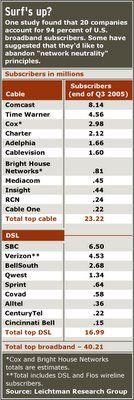Net Neutrality in Danger
 Daily Wireless has an exceptionally good post about the recent developments in congress over net neutrality.
Daily Wireless has an exceptionally good post about the recent developments in congress over net neutrality.From the post:
"In a blow to proponents of "Net Neutrality", Rep. Joe Barton, the Texas Republican who heads the House Energy and Commerce Committee, released new text on the proposed bill today.
Phone companies and cable TV operators alike could seek permission to launch video in communities through a national franchising process, according to the bill, which Rep. Barton said is being co-sponsored by Rep. Bobby Rush, D-Ill. A hearing is scheduled for Thursday at 10 am ET.
A November draft (PDF) of Barton's bill explicitly said broadband providers "may not block, or unreasonably impair or interfere with" Internet access. But the final version (PDF), simply gives the FCC the authority to set rules and publish violations.
Sen. Ron Wyden, an Oregon Democrat, took aim at Barton's proposal on Monday.
"This legislation begins the construction of a multilayered, toll-strewn information superhighway that is out of sync with what has made the Internet work: access for all," said Wyden, who introduced his own bill earlier this month mandating Net neutrality.
Still...in France you get 20 megabits/s for $36/mo. Japan charges an average of $41.00 for a 100Mbps connection. Stockholm's one-gigabit service is $120/month. Japan's Softbank BB uses Cisco Catalyst 6500 switches under the "Yahoo! BB" brand name. South Korea's government spent $24 billion building a national high-speed backbone network.
How can Korea's KT, Hong Kong Broadband Network, Taiwan's Chunghwa Telecom and Japan's Softbank BB deliver ten times the speed of U.S. telcos at less cost? Because they installed next generation fiber infrastructure. It's not unlike Comcast's regional fiber backbone which uses the Cisco CRS-1 Carrier Routing System, Nortel's Edge 6500 and Level 3's optical backbone."




3 Comments:
I am not quite sure where to start with this comment. Yes more backbone requires investment. Something 15 other nations around the world are currently doing better then the US.
It seems to me that the Telcos who want to charge more (again) for bandwidth are trying to get paid a third time for the same lines. In addition the majority of the issue seems to revolve around telco's desire to offer video products via IPTV and compete with cable companies. I have read that Verizon is reserving 80% of its network for video.
I am not sure who is doing the stuffing. Telcos want to have a two tiered internet where they get paid more from the very companies that have made their products valuable. The telcos are teh ones trying to stuff down regulation.
I will take the time to source these statements when you come out from behind your little alias and say what telco you are a flack for.
the somewhat mysterious and anonymous pkp646 (I'm mysterious, but that's my real name and i'm easy to find) left a comment on my Vleeptron blog saying I've been lied to, Net Neutrality is not an important issue.
i wish he/she/it were a bit more transparent and sunshiney. Without knowing who he/she/it is, I suspect a pro troll working for the telecoms.
meanwhile check out The New Yorker's take on Net Neutrality:
http://www.newyorker.com/printables/talk/060320ta_talk_surowiecki
... which notes that Congress historically mandated "Phone Net Neutrality" -- all phone system users get equal access, speed, the same virtues of the infrastructure that huge institutional users get.
Didn't seem to put too much of a crimp in phone company profits or impede their improvements to the infrastructure.
You should know that pkp646 is part of a tag-team of industry shills who invade blog comments on net neutrality to argue against any government regulation of the Internet. Other names who run with this crowd are John Rice, paulaner01, oldhats, lessgov and AJ Carey. (Google any of these names in combination and you’ll see how their game works).
Read more about them here.
By tag-teaming the blogs, this small band of individuals gives the false impression of broad popular support for an industry-friendly position.
What they really want is for Congress to radically re-write our telecommunications laws so that companies like AT&T, Verizon and BellSouth can swoop in and become gatekeepers to Internet content — in a way that benefits no one except the largest ISPs.
I’d like these people to tell us how it is that they appear together (usually one after the other) praising one another’s comments and spouting identical industry talking points across the blogosphere.
What gives pkp? Are you being paid to do this? And by whom?
Post a Comment
<< Home